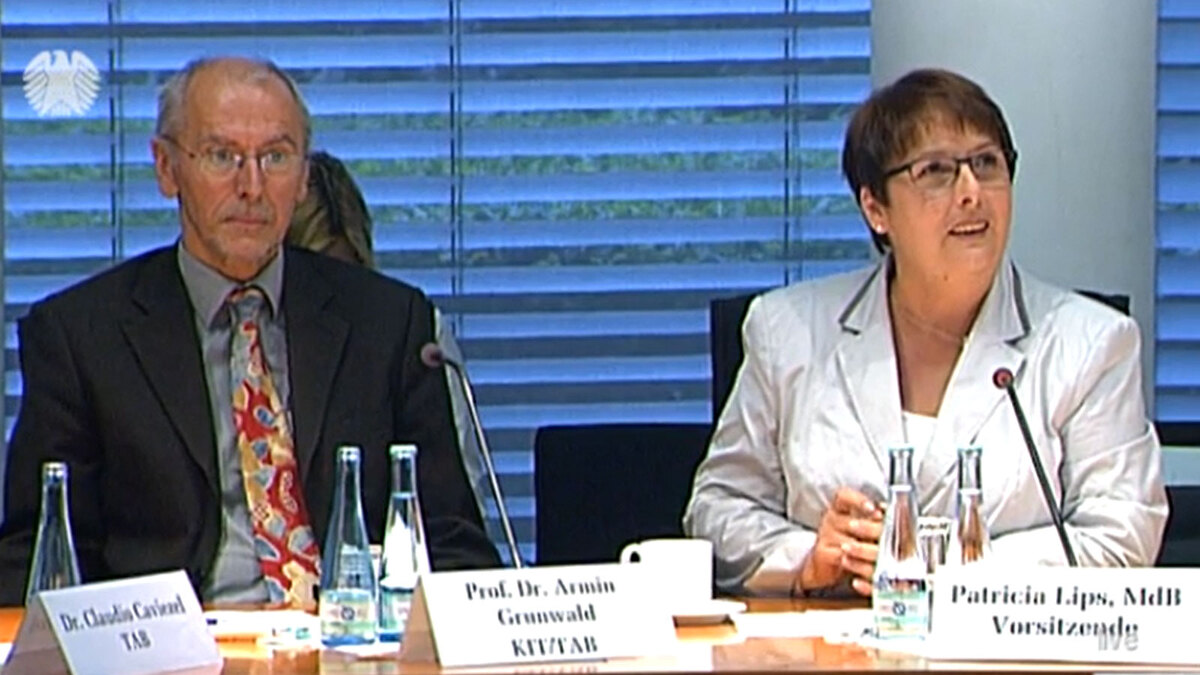Public committee meeting on the TAB report »Climate Engineering«
Based on the results of the TAB project "Geoengineering", members of the German Bundestag discussed further steps in dealing with these possible climate measures with experts and the interested public on September 24, 2014. The event, entitled "Climate engineering - useful instrument or dead end in climate policy?" was attended by a total of around 80 people, including a high school class from NRW.
The initial question of the TAB project launched in 2012 was under which conditions Climate Engineering (CE) - i.e. deliberate and targeted technical interventions in the climate system on a large-scale to global scale - could make a contribution to preventing climate change that could have serious consequences. As TAB-Arbeitsbericht Nr. 159 (only in German), completed in summer 2014, shows, there are no easy answers to this question, in part because CE options would fundamentally alter the scope of climate policy action. Rather, what becomes clear is the urgent need for a broad discussion on whether or which approaches to climate engineering should be pursued further at all, and what risks society should accept for this.
In order to promote this discourse and in view of the potential importance of the topic for future climate protection policy, the committee responsible for education, research and technology assessment decided to hold a public committee meeting in meeting room E 300 of the Paul Löbe House. Based on the central question "What further (political) steps are necessary in dealing with climate engineering?", a discussion moderated by the head of TAB, Armin Grunwald, developed between rapporteurs for TA of the parliamentary groups, other parliamentarians, experts from science and politics, the authors of the TAB report (Claudio Caviezel and Christoph Revermann) as well as other participants.
Due to the World Climate Conference taking place in New York at the same time, the topic of "climate and measures for CO2 reduction" has currently moved back into the public focus, and in this context, the statements of the TAB report as well as the statements of the invited experts tended in the direction that the scenarios of climate research are becoming increasingly pessimistic and all the more new strategies for climate protection are being considered - especially the various approaches of climate engineering.
However, it also became clear that both the representatives of politics and the invited experts were critical of or completely opposed to the strategies and technologies of climate engineering. More or less unanimously, it was doubted that the CE options, which are still at the very beginning of conceptual considerations and research, could ultimately be an effective means of limiting CO2 reduction (CDR - Carbon Dioxide Removal) or reducing global temperatures by intervening in the Earth's radiation budget (RM - Radiation Management). However, all sides agreed with TAB's assessment that the socio-political discussion must be addressed and conducted (now).
Sebastian Harnisch, Professor of International Relations and Foreign Policy at the Ruprecht-Karls-University of Heidelberg, underlined TAB's statements that the possible options of climate engineering should in no case replace the existing measures for CO2 reduction. Ralph Bodle, Senior Fellow at Ecologic Institute in Berlin and renowned German expert in the relevant climate negotiations, spoke on the international legal framework. According to him, there are a few regulations, but they are still sufficient, at least for the time being. However, it would make sense to first develop - also nationally - own research priorities and regulations on possible CE applications.
Karl Eugen Huthmacher, head of the "Provision for the Future" department at the German Federal Ministry of Education and Research, praised the TAB report as an important contribution to the debate, especially with regard to German research policy in the field of climate engineering. He also emphasized that the known climate protection instruments had priority. Klaus Müschen, head of the "Climate Protection and Energy" department at the Federal Environment Agency, also spoke in favor of the "precaution before repair" principle and advocated more intensive research into the risks of climate engineering.
29.09.2014
Further information:
- Program
- Experts take a critical view of climate engineering. Article on the event on the website of the German Bundestag.
- Climate Engineering. TAB-Fokus no. 3
- Climate Engineering - Endbericht zum TA-Projekt "Geoengineering"..
TAB-Arbeitsbericht Nr. 159 (only in German) - Geoengineering project page

